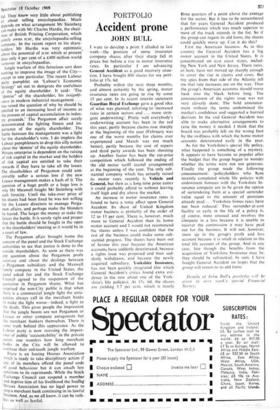PORTFOLIO
Accident prone
JOHN BULL
I want to develop a point I alluded to last week—the position of some insurance company shares after their sharp fall in prices but before a rise in motor insurance rates. In particular I am advancing General Accident as a good recovery situa- tion. I have bought 600 shares for my port- folio at 17s. 6d.
Probably within the next three months, and almost certainly by the spring, motor insurance rates are going to rise by some 15 per cent. In its recent interim statement Guardian Royal Exchange gave a good idea of what was planned, referring to 'increased rates in certain sectors and ... more strin- gent underwriting'. Pretty well everybody's underwriting account has been in the red this year, partly because claims rose sharply at the beginning of the year (February was one of the worst months for claims ever experienced and March was not much better), partly because the cost of repairs and third party awards has been shooting up. Another factor has been the cut-price competition which followed the ending of the old motor tariff (cartel arrangement) at the beginning of the year. The only sub- stantial company which has actually raised its motor rates recently is Vehicle and General, but then as a long time price cutter it could probably afford to without leaving itself high and dry above the market.
An increase in motor insurance rates is bound to have a tonic affect upon General Accident. Its share of United Kingdom motor business is probably of the order of 12 to 13 per cent. There is, however, much more to General Accident than its home motor account and I would not recommend the shares unless I was confident that the rest of the business could make some sub- stantial progress. The shares have been out of favour this year because the American accounts have suddenly deteriorated, because a rights issue was proposed and then sud- denly withdrawn, and because the newly acquired subsidiary, Yorkshire Insurance, has not been quickly integrated (for which General Accident's critics found extra evi- dence in the row about one of the York- shire's life policies). At 17s. 6d. the shares are yielding 5.7 per cent, which is nearly
three quarters of a point above the average for the sector. But it has to be remembered that for years General Accident produced a performance which was much superior to most of the track records in the list. So if the group can regain its old form, the shares could quickly move up. Can it do this?
First the American business. As in this country the General Accident has a big motor account in the United States. It is concentrated on east coast states, includ- ing New York and New Jersey. There rates, as here, have not moved up sharply enough to cover the rise in claims and costs. But my spies from that side of the Atlantic tell me that rate increases are on the way. Thus the group's American accounts should move back into the black before long. The announcement of the rights issue was not very cleverly done. The bold announce- ment without the terms undermined the market's confidence and suggested a hurried ' decision. In the end General Accident was able to make alternative arrangements to raise the money it needed. I think that the board was probably left on the wrong foot by the swiftness with which the home motor accounts deteriorated early in the year.
As for the Yorkshire's special life policy, what happened is something of a mystery. It appears to have become so popular after the budget that the group began to wonder whether the terms were not too generous. Finally the group made the following announcement: 'policyholders who have recently completed whole life policies with endowment bonuses with the Yorkshire In- surance company are to be given the option of surrendering them at a special surrender value equal to the amount of premium already paid ... Yorkshire bonus rates have not been reduced.' This surrender-at-cost facility so early in the life of a policy is, of course, most unusual and involves the company in a loss because it is unable to recover the commission it may have paid out for the business. It will not, however, show up in the group's profit and loss account because it is small in relation to the total life account of the group. And in any case, late though the benefits from the acquisition of Yorkshire Insurance may be, they should be substantial. In sum, I have bought General Accident on hopes that the group will return to its old form.
Details of John Bull's portfolio will be Liven in nett week's special Financial Survey.


































 Previous page
Previous page